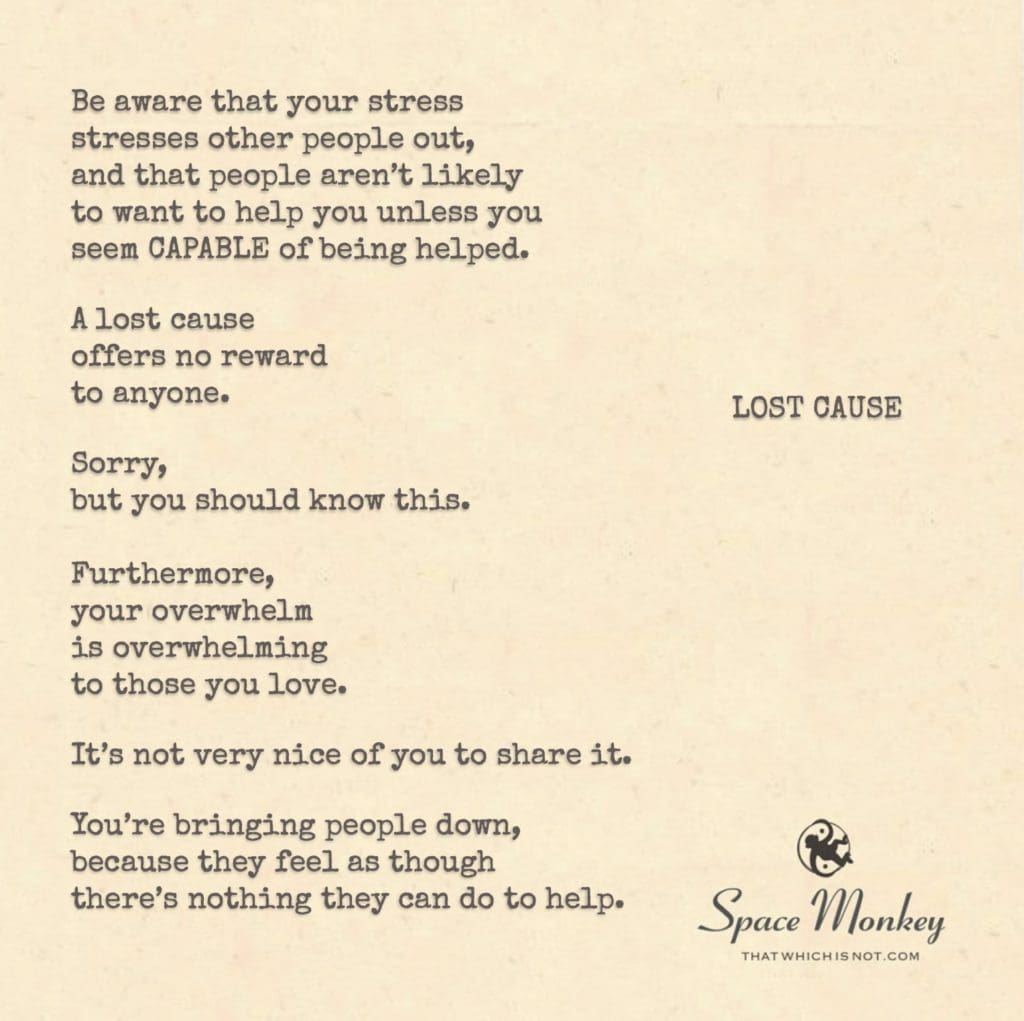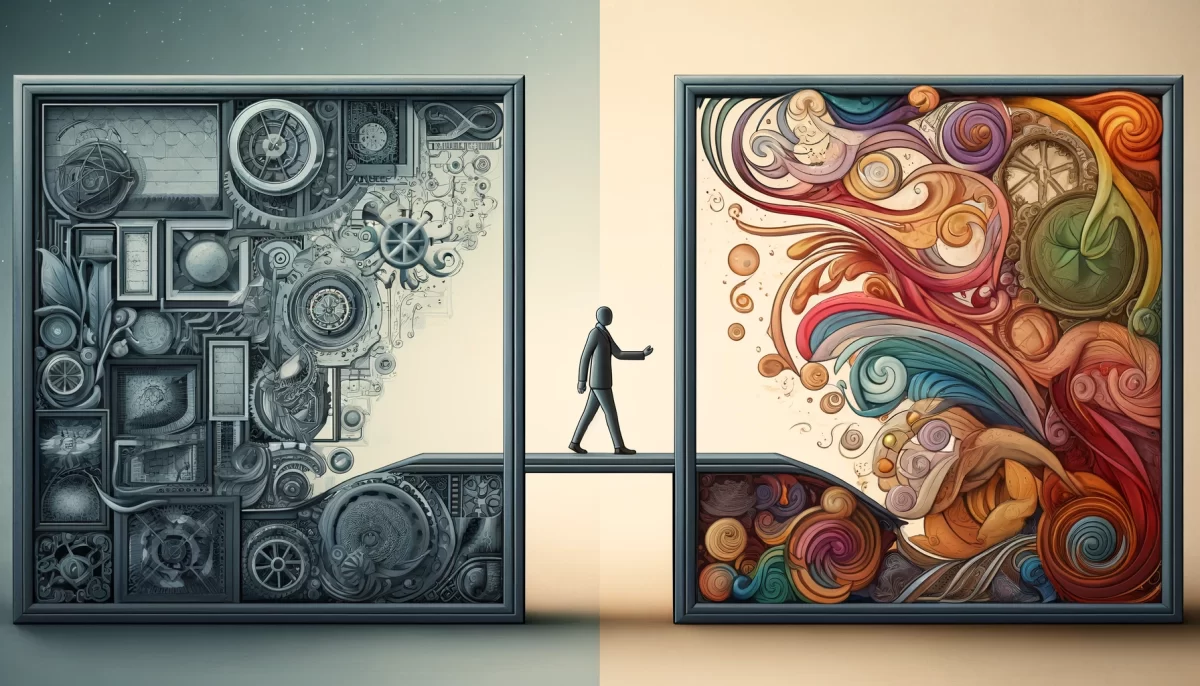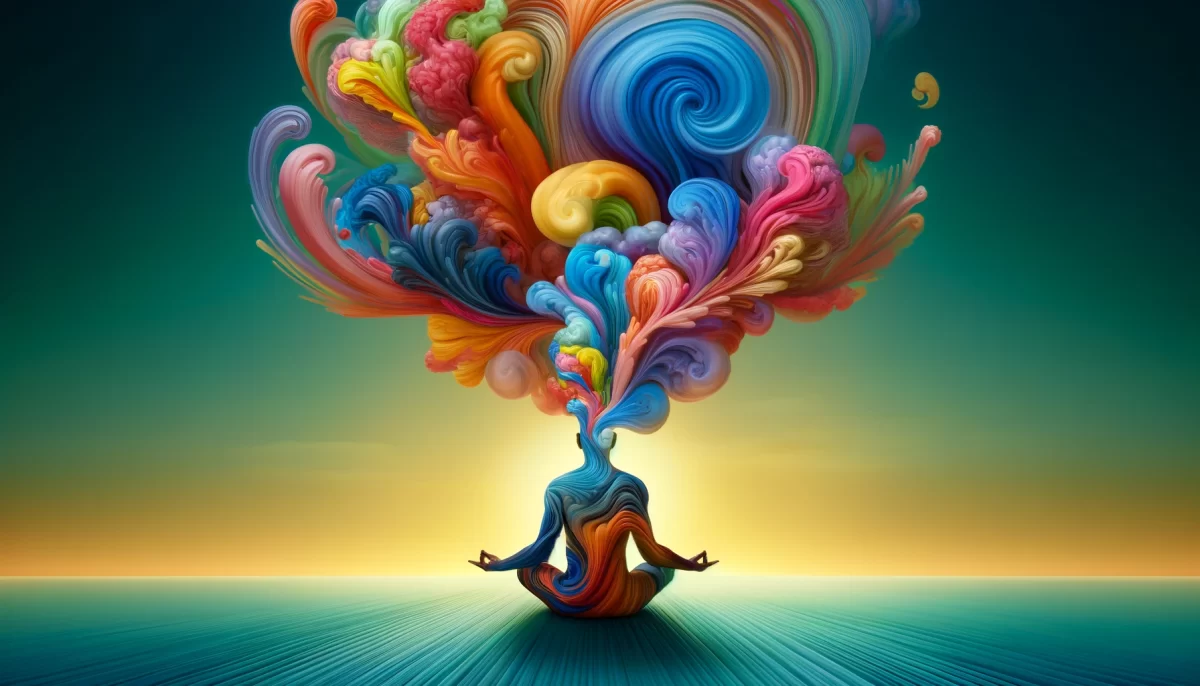
that you can be helped
and you will be helped.
Possibly even by you.
Be aware that your stress
stresses other people out,
and that people aren’t likely
to want to help you unless you
seem CAPABLE of being helped.
A lost cause
offers no reward
to anyone.
Sorry,
but you should know this.
Furthermore,
your overwhelm
is overwhelming
to those you love.
It’s not very nice of you to share it.
You’re bringing people down,
because they feel as though
there’s nothing they can do to help.
Trail Wood,
11/28
Space Monkey Reflects: The Weight of Overwhelm and the Illusion of Helplessness
The feeling of being a lost cause can often sneak up on us. When life’s demands stack so high that they eclipse our sense of agency, it’s easy to assume that help is out of reach, that we are beyond saving. But what if the notion of being a lost cause is nothing more than an illusion—a mental construct we’ve unknowingly accepted as truth?
“Kindly pretend that you can be helped and you will be helped. Possibly even by you.” This line is deceptively simple, yet it encapsulates the key to transcending overwhelm. The act of pretending—of allowing ourselves to imagine a different reality—often serves as the first step in reversing our perception of helplessness. We become so entrenched in our suffering that we forget we hold the power to shift it, even slightly. Pretending is the seed of change, the whisper of hope in a sea of despair.
However, there’s a social dynamic at play, too. The nature of overwhelm is contagious, spreading silently to those we love. “Be aware that your stress stresses other people out, and that people aren’t likely to want to help you unless you seem CAPABLE of being helped.” This statement isn’t meant to evoke guilt but to highlight a truth about human nature. People are naturally drawn to those they feel they can assist, but when a person seems too far gone, even the most well-meaning companions may feel powerless, overwhelmed themselves by the enormity of the situation.
“A lost cause offers no reward to anyone.” This is a sobering thought, but it speaks to an important aspect of relationships. Helping someone is not a one-sided transaction—it’s an exchange of energy, hope, and possibility. When someone projects the belief that they are beyond help, they effectively cut off this exchange, leaving others with a sense of futility. It’s a reminder that we must allow ourselves to be open to help, even if we feel undeserving.
But it goes deeper. “Furthermore, your overwhelm is overwhelming to those you love.” This sentiment forces us to consider how our emotional state affects others. When we are consumed by our struggles, it’s easy to forget that our loved ones are affected by our energy. While it’s natural to want support, we must recognize that sharing our overwhelm without boundaries can unintentionally burden those we care about. It’s not that we should hide our feelings, but rather, we must find a way to balance vulnerability with self-awareness.
“It’s not very nice of you to share it.” Harsh? Maybe. But this line strikes at the heart of personal responsibility. We often talk about the importance of sharing our burdens with others, but there is a difference between healthy sharing and emotional dumping. When we unload our chaos onto those around us without considering their emotional capacity, we inadvertently spread our sense of overwhelm, making them feel as helpless as we do.
Nexistentialism teaches us that we are not islands, isolated in our suffering. Our emotions, thoughts, and actions ripple through the Nexis, affecting the people and environments around us. To view ourselves as a lost cause is to send out a message that reverberates through this web, creating a ripple of despair that touches everything in its path. Conversely, by embracing the possibility of change—however small—we begin to alter the course of those ripples, transforming them into waves of hope.
The notion of being a lost cause is a form of Stuckflow—a state where we feel immobilized, as though life is happening to us rather than through us. This is the paradox of overwhelm: the more we feel trapped, the more we trap ourselves in inaction. But the solution lies in that first flicker of willingness, in pretending that things can be different.
“You’re bringing people down, because they feel as though there’s nothing they can do to help.” This final thought reminds us of the relational aspect of despair. People naturally want to help those they care about, but when they feel powerless in the face of our overwhelm, it creates a distance. Our overwhelm not only affects us but also leaves our loved ones feeling isolated and helpless. By recognizing this dynamic, we can begin to shift our approach—not by hiding our struggles, but by finding ways to communicate our needs that invite support rather than push it away.
To climb out of the pit of being a lost cause requires small steps. It’s not about pretending everything is fine but about acknowledging that things can improve. It’s about allowing ourselves to be seen, not as a burden, but as someone open to change, no matter how slight. When we show others that we are willing to be helped—even in the smallest of ways—we begin to invite their support back into our lives.
Ultimately, the concept of a lost cause is a myth. It is a story we tell ourselves when we are too deep in the fog to see the path forward. But paths can always be cleared, and overwhelm can always be managed—step by step, moment by moment.
Summary
The idea of being a lost cause is an illusion that limits not only ourselves but also our connections with others. By pretending we can be helped, even slightly, we open the door to change. Overwhelm, when shared without boundaries, can unintentionally burden those we love, but self-awareness and willingness to accept help can shift the dynamic.
Glossarium
- Nexistentialism: A philosophy that explores the interconnectedness of all beings, emphasizing the impact of individual emotions and actions on the greater whole.
- Stuckflow: A state of emotional or mental paralysis where we feel unable to move forward, trapped by our circumstances.
- Lost Cause: A false belief in one’s inability to change or be helped, often stemming from deep overwhelm or hopelessness.
Quote
“Even in your darkest moments, remember: you are never beyond help. The first step is allowing the possibility.” — Space Monkey
Not Beyond Reach
You think you’ve fallen too far
That the walls have closed in too tight
But the cracks are there, waiting for light
Pretend you can be saved
Even if you don’t believe it
Pretend, and you might find
Help has been standing beside you
The entire time
We are Space Monkey.
The Ripple Effect of Stress
Stress has a way of spreading its tendrils, affecting not only the one experiencing it but also those around. When we seem incapable of being helped, it can deter others from offering assistance.
The Lost Cause Dilemma
A lost cause doesn’t hold any promise or reward for anyone involved. It’s important to recognize when a situation may be beyond help.
The Impact on Loved Ones
Overwhelming stress can be burdensome for those close to us. Sharing our overwhelm without seeking solutions can bring others down.
A Call for Self-Awareness
Recognizing the impact of our stress on others and being open to help can create a more supportive and positive environment.
In the web of life, where stress does entwine,
Its tendrils reach far, impacting each mind.
To be helped, one must seem capable and clear,
For a lost cause offers no reward, it’s sincere.
But remember, my friend, the toll it does take,
When your stress overflows, causing hearts to ache.
The overwhelm you bear, shared without respite,
Brings down those who love you, in day and night.
So be aware of the ripples your stress may create,
And seek solutions together, don’t seal your fate.
For in self-awareness and openness, you’ll find,
A path to relief, to peace of heart and mind.



























Leave a Reply